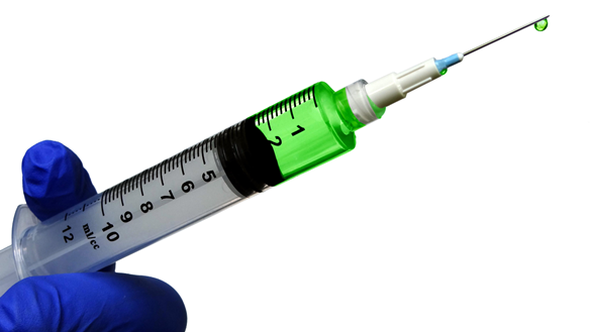Collateral Damage: How the Lyme Vaccine Made a Life Less Ordinary
November 3, 2007 in Stories by PJ Langhoff
David Alloco was an exceptional athlete, with incredible stamina, both physically and mentally. In fact, in 1983, David underwent an operation to remove a benign brain tumor, which did nothing to slow him down. Five days a week, from the time he was a junior in high school, David was entrenched in body building training. As a matter of fact, he was a familiar fixture as the gym became a "second home" to him.
He stuck with his grueling schedule throughout college, where he also played semi-pro football for the Rochester Warriors (NY, now renamed); and flag football in the off-season. When he accidentally tore his Achilles tendon, he was forced to give up his beloved football despite an early complete recovery, and he consoled himself with body building, and enjoyed hunting and fishing. Despite a prior medical history of left knee problems which required two surgeries over the years, and leaving him with intermittent mild left knee pain, David was living what he considered an otherwise normal, full life.
But in 2000, New York was already considered a high-risk area for contracting Lyme disease, and anyone spending time outdoors was at an increased risk for tick bites, and possible illness. In May of that year, on advice from his doctor, David agreed to undergo a series of three injections of the LYMErix vaccine, with the objective that the shots might protect him from contracting Lyme, a disease which, if left undiagnosed and untreated, can have debilitating consequences.
Being so physically fit and active, the vaccine seemed to make sense to David, despite the fact that he never recalled ever being bitten by a tick. At the time of the first vaccination, David was provided with a basic pamphlet of information which he found on his doctor's table. It was a typical "feel-good" brochure meant to assuage patient fears, and he does not recall reading any information about serious side effects or other possible risks associated with the vaccine. His doctor did not offer any information about side effects, risks, or complications, either. And David was never provided any type of waiver or consent form to sign prior to receiving any of his vaccinations.
In fact, getting immunized seemed like a "good idea" to David, who relied on his doctor's knowledge and advice in his decision to be vaccinated. David does not recall any immediate problems or symptoms with the initial dose, but did notice a short time later, that he had increased pain in his left knee, and new onset pain in his right knee. He mentioned this to his doctor at subsequent visits, and David witnessed the physician recording the symptoms in the chart each visit.
The following month David received a second injection. When asked about symptoms, increasing knee pain was communicated. Because David felt the vaccinations were costly at $50 each, he waited to receive his third and final shot until December of the same year, which he timed to coincide with hunting season.
On January 4, 2001, David rose early that morning but didn't "feel well". He descended his stairs and entered the kitchen to make a protein drink. It was then that he began to feel "weird." David says, "I was reaching for a glass, and I felt kind of like my arm was sort of detached, like an out-of-body experience if that makes sense."
So David started to go back upstairs and when he looked at his fiancé, he said, "I really feel 'f-d' up" (his exact words to her). David proceeded to get ready for work, and that's when he found himself flat on the floor. When he first collapsed, his face was "all tingly" and David says he "went numb" from the waist down. David thinks he was unconscious for a few moments, and when he came to, he found himself lying on the floor as his fiancé was calling 9-1-1. "It felt like an eternity to me", said David, who was more concerned about his fiancé being frightened, than his own fears for his health.
David was taken by ambulance to Rochester General Hospital, where he was first diagnosed with a "stroke", but a CAT scan ruled that out, and his final diagnosis was "dehydration" and a "viral syndrome?" (the question mark was part of the diagnosis). This perplexed David because he says through force of habit he already drank "a ton" of water and juice.
The hospital offered him no further treatment or antibiotics, however. Four days later with a fever, David returned to the same hospital, where he was given IV fluids, and a repeated diagnosis of "viral syndrome."
Later after reviewing his medical records, David noticed the words "absent seizures", but nothing seizure-related was ever discussed with him. David returned to his regular doctor, with increased pain in both knees, which he describes as feeling like "strong growing pains." At the time David was already on pain management medications for his residual left knee problems, but it wasn't helping the new pains.
Finally in June of 2002, David had to give up his body building training, due to the pain and a new onset lack of stamina. And by fall of the following year, David was forced to give up his employment as a level three inpatient pharmacy tech due to the intensity of his pain.
Just before stopping work, a colleague who was learning to compound at the same pharmacy, noticed David limping around work, and sweating profusely. The friend told him he looked sickly. David says they were "talking shop" and the friend asked him if he ever did anything outdoors like hunting or fishing, to which David replied, "oh yeah, I love that." But David told his friend that he didn't "have to worry" about Lyme, because he already had been vaccinated. His friend informed David that he had done a project for one of his pharmacy classes at the University and it happened to be on the topic of Lyme disease. (His report was written in February of 2002.)
The friend told David that the vaccine had just been pulled from the market, which surprised David, as his doctor never mentioned that at any of his previous visits, even after David received the vaccination. After the friend's comments, David did some research on the LYMErix vaccine and learned about the link between LYMErix and treatment-resistant arthritis, in a subset of people who may be predisposed to problems after receiving the vaccine. This caused him great concern as he had similar symptoms to findings among the research.
So David made an appointment to see his doctor, because he suspected that he knew what was causing his painful knees - the vaccine. When he arrived at the clinic, he first saw the physician assistant. When David suggested his pain was from the vaccine, the PA told him "you didn't get the vaccination", to which David replied, "Yes I did." But the PA said, "I don't see that" (in the chart).
The PA and David went to speak with the doctor and the nurse who had actually given David the injection. David knew that the nurse would definitely remember him. David says he felt he had to "prove" to the PA that he had received the vaccines, because she was stating that he hadn't, according to his chart. Once the nurse who gave David the shots admitted to giving them, the doctor said to the PA, "Yeah, give it to them", which David interpreted to mean give them the file.
So the PA looked at the chart again, and said, "Yeah, you're right, here it is" - it was the same chart she had been holding in her hands moments before. David asked the doctor to test him for Lyme (based on the vaccine and his arthritis-like pain). The doctor ordered a "Lyme test", drawn the following day, and which within one week, returned "negative."
David was referred to an osteopath, who planned to do exploratory surgery, but David also saw an Infectious Disease specialist. David delayed the surgery and concentrated on treatment with the ID doctor, a woman, and someone who routinely treated chronically ill AIDS patients. The specialist admitted she knew little about Lyme disease, but told David, "we'll learn together," an attitude which should be commended for its exceptional patient-friendly, open-minded, logical, and sadly, extremely rare qualities.
The physician ordered a series of blood work in which David was found CDC positive for IgM on a Lyme western blot test performed by a routine national laboratory.
David saw the ID doctor monthly, and was prescribed Neurontin and methadone. It was the first time in years where he received any noticeable pain relief.
In late 2002, David's eyesight began to noticeably change, and he went through four different eye prescriptions in a year. He had blurred vision and difficulty seeing things at a distance, which he noticed when he could no longer see through his gun sight and shoot. In fact, he says he couldn't read things as close as a chalkboard.
And while the pain became intense, his short-term memory began to suffer. According to David, it rapidly "flew out the door." Previously, David had an excellent memory. So good in fact, that he never had to record assignments in college, but committed them to memory. Now David found it difficult to juggle numbers, like phone numbers of family which he would normally have no problem recalling.
When he fell asleep, sometimes he would get a feeling of "going into a black hole", which he found strangely similar to what he experienced when he had his brain tumor. His doctor took him off Paxil (which he was also taking) and put him on Klonipin instead, which seemed to take care of the sleep anomalies.
David was also prescribed Ritalin, which he has to take four times daily or he says it's like "unplugging a plug". David also has pain in both of his feet now, which he treats with lidoderm patches.
During this process, David and his fiancé married, and he says his wife is "very supportive". He feels fortunate that her job provides them with medical coverage, which he says to date, has been "pretty good" about paying for his health care.
He also received disability Medicare, but hasn't needed it. David also receives a disability stipend that is around $1,000 a month, not much when you consider the out-of-pocket costs of co-pays, prescriptions and over-the-counter medications.
David used to have private disability through his past employer, but he was suddenly "dropped" because they claimed his painful knees were a "pre-existing" condition, (he had prior surgery on one of them, and had been on painkillers for a period of time.) His life insurance through the same company was also cancelled without his consent. He hired an attorney to help fight the insurance carrier's determination, but David was advised by his attorney that he should elect for a small payout so as not to "mess up" a case he was filing pertaining to the vaccine complications.
During his research of Lyme, David learned that other people were experiencing similar symptoms. He says it was like reading a "carbon copy" of his own symptoms, which David describes as eye pain, visual changes, sleeping problems, joint pain, swelling, fatigue, and severe memory problems.
After David tested positive for Lyme, he looked into filing a suit against the vaccine manufacturer. He hired a Pennsylvania firm to handle the litigation. But once his regular family doctor discovered that David had filed a suit, he dismissed himself as his physician, telling David he would have to seek health care else-where as it would be a "conflict of interest" to remain as his care provider. But his doctor at least noted in David's chart that it was his opinion that David's symptoms were related to the vaccines.
David trusted the doctor and looked for a new physician, but each one declined to treat him once they learned of his lawsuit. David's ID doctor became his primary care provider - the only doctor who didn't abandon him. Now in 2007, David learned his original doctor may be denying that he ever wrote that David's symptoms were related to the vaccine - but David has copies of his original records saying otherwise.
The attorney for the vaccine case required David to see a physician in New York City, for the purposes of an examination and case review. David felt the doctor, (a neurologist), seemed arrogant and only wanted money. The doctor performed a series of skin punch biopsies, and David was diagnosed with peripheral neuropathy.
Over the course of the next 2-3 years, David went back and forth for more biopsies, including a nerve biopsy which made half of his left foot permanently numb. David also endured immunoglobulin treatments which he calls "grueling as hell", and which cost $1.2 million dollars for the first year alone. The treatments were 5 days a week every month and they lasted 5-6 hours at a time.
David's LYMErix lawsuit was filed in 2003, but not as part of a class action. David was advised, and elected to use arbitration. He and his attorney agreed on a $5 million award for damages if awarded, which they felt might put a dent in his lost wages and ongoing medical expenses. He was told arbitration would be shorter than a trial - perhaps months to a couple of years, as compared to many years at full trial.
Arbitration began, and time went by. After a couple years and his attorney no longer in contact with him, David went on the internet only to discover that his attorney's name had been removed from the firm's web site. He called the firm, and was told that his attorney had been disbarred and was no longer representing him!
Without an attorney, David contacted a friend (who was also an attorney), who researched his case and discovered a decision had been made in September, 2004, (three years earlier) and David hadn't been notified! "Discontinued without prejudice" was the term used for his case. Because of this fiasco, David's friend advised that he might still have a case, but now David is considering a malpractice suit, as well as having to begin from scratch on his vaccine case.
After waiting four years, David says he feels "seriously screwed" by the process, and is rightly disgusted. He also wonders how many other vaccine recipients are in a similar situation.
For 4 years David waited patiently for help to pay for his medical costs, and now he has received this setback. It was August of 2007 when this interview took place, and David revealed he had learned just that week about the arbitration determination. He also revealed that, to date, (except for this interview), no one, not even the attorney representing David, has ever interviewed him about any aspect of his story, his symptoms, or his case in general.
When David demanded the file on his case, the law firm sent him a 17-page report which he feels does not accurately reflect his case or his medical records. The firm also sent him a letter which David said seemed to infer that he had somehow "misrepresented" himself, which he finds ridiculous. Now he says the firm seems to be backpedaling about his case, and the firm has even changed names three times through this process.
As for the stress of the entire deal, David says, "Are you kidding? It kills me, it kills me. It amplifies everything." When asked what kind of a toll his medical situation has taken on his marriage, David is very realistic about the process. "My wife... She's great. She's understanding and supportive and great and everything. But long-term, over time, who knows what will happen? People get tired. What happens when people get tired?"
Despite wanting a family, David and his wife have made a conscious decision not to have children, which has been hard. "I couldn't you know, with me being sick - how am I going to deal with children? And another thing", David says, "there is the possibility of maybe spreading it. "The LYMErix vaccine was based on recombinant technology, which is the genetic engineering of DNA - hence Borrelia burgdorferi DNA would be present in David's body from the vaccine.
David worries that if he carries the Lyme spirochete or a form of it (Bb) that it could be, or has already been, passed onto his wife - and possibly children. He has read information that describes how Borrelia burgdorferi has been found in semen and breast milk and that there are studies showing maternal - fetal infection in utero.
David says he believes his wife might also be suffering from Lyme, but so far she has not agreed to be tested, though he says she has pain in her hip and her feet - both places where Lyme patients complain of pain. David reiterates that he and his wife are "very strong" in their decision not to pass this illness on to children, and says his wife has been "very supportive all the way around" with this illness, a kind of support many chronically ill patients aren't fortunate enough to have.
David recently found a Lyme-literate physician, a doctor who specializes in Lyme cases, who is helping manage his care. But the road ahead for David is truly uncertain.
One neurologist told him he had suffered a possible stroke in 2005 and again in 2006, based on MRI's showing brain lesions, but another doctor told him "lesions are nothing", and said David "was fine" - leaving him confused about his health. On the one hand, he knows he is debilitated and declining everyday, and on the other hand, there are physicians who dismiss him, and say there is nothing wrong. Fortunately, his LLMD is in-line with David and he will continue to pursue treatment as long as he can afford to.
Through this process, David says the toughest part of dealing with his symptoms is,"it's like a mind game, and there may come a day when I can't play it any longer. I have to keep mentally strong, you know, 10 years from now, how will we deal with this?"
David is aware of the importance of building a personal support team of friends and family to help with the emotional and practical aspects of chronic illness. He knows the importance of private, quality time between husband and wife, where the focus is not on disability or illness, but on positive things.
As for facing a future of unknowns, David wonders what kind of monetary compensation would now be appropriate, as the cost of medication and treatments leave a question mark in his mind. "I have expenses I never even thought about now," says David, "like the fact that I have to pay someone to mow my grass, or cut my bushes, because I can't." Then there will be costs to re-litigate his case.
David deals with the anger and frustration he feels from being given a vaccine that manufacturers may have known could be harmful to some patients, in the best way he possibly can. He accepts that he can't change the past, and he looks to the future, desiring to tell his story and raise awareness to prevent others from suffering a similar fate.
Asked if he wanted to be part of an article about what life is like after receiving the LYMErix vaccine, he replied, "in a heartbeat I would". And if David could travel backwards in time to choose not to have received the LYMErix vaccine, I suspect that his answer might also be the same.
Taken from the pages of the FDA's statistical review and evaluation of the LYMErix vaccine, with sponsor SmithKlineBeecham, dated June 30, 1998, we reveal the following information, parenthesis added by author for clarification:
Background: "During a telecon on May 13, SKB (SmithKlineBeecham) notified CBER (Center for Biologics Evaluation and Research) that there were specific concerns regarding CMI (cell-mediated immunity) issues and the possibility that the OspA portion of the protein in their Lyme vaccine could induce a chronic-resistant form of arthritis in some individuals..."
The vaccine was approved by the FDA in December of 1998, and pulled from the market by the manufacturer on February 26, 2002, citing "poor sales".
Resources
He stuck with his grueling schedule throughout college, where he also played semi-pro football for the Rochester Warriors (NY, now renamed); and flag football in the off-season. When he accidentally tore his Achilles tendon, he was forced to give up his beloved football despite an early complete recovery, and he consoled himself with body building, and enjoyed hunting and fishing. Despite a prior medical history of left knee problems which required two surgeries over the years, and leaving him with intermittent mild left knee pain, David was living what he considered an otherwise normal, full life.
But in 2000, New York was already considered a high-risk area for contracting Lyme disease, and anyone spending time outdoors was at an increased risk for tick bites, and possible illness. In May of that year, on advice from his doctor, David agreed to undergo a series of three injections of the LYMErix vaccine, with the objective that the shots might protect him from contracting Lyme, a disease which, if left undiagnosed and untreated, can have debilitating consequences.
Being so physically fit and active, the vaccine seemed to make sense to David, despite the fact that he never recalled ever being bitten by a tick. At the time of the first vaccination, David was provided with a basic pamphlet of information which he found on his doctor's table. It was a typical "feel-good" brochure meant to assuage patient fears, and he does not recall reading any information about serious side effects or other possible risks associated with the vaccine. His doctor did not offer any information about side effects, risks, or complications, either. And David was never provided any type of waiver or consent form to sign prior to receiving any of his vaccinations.
In fact, getting immunized seemed like a "good idea" to David, who relied on his doctor's knowledge and advice in his decision to be vaccinated. David does not recall any immediate problems or symptoms with the initial dose, but did notice a short time later, that he had increased pain in his left knee, and new onset pain in his right knee. He mentioned this to his doctor at subsequent visits, and David witnessed the physician recording the symptoms in the chart each visit.
The following month David received a second injection. When asked about symptoms, increasing knee pain was communicated. Because David felt the vaccinations were costly at $50 each, he waited to receive his third and final shot until December of the same year, which he timed to coincide with hunting season.
On January 4, 2001, David rose early that morning but didn't "feel well". He descended his stairs and entered the kitchen to make a protein drink. It was then that he began to feel "weird." David says, "I was reaching for a glass, and I felt kind of like my arm was sort of detached, like an out-of-body experience if that makes sense."
So David started to go back upstairs and when he looked at his fiancé, he said, "I really feel 'f-d' up" (his exact words to her). David proceeded to get ready for work, and that's when he found himself flat on the floor. When he first collapsed, his face was "all tingly" and David says he "went numb" from the waist down. David thinks he was unconscious for a few moments, and when he came to, he found himself lying on the floor as his fiancé was calling 9-1-1. "It felt like an eternity to me", said David, who was more concerned about his fiancé being frightened, than his own fears for his health.
David was taken by ambulance to Rochester General Hospital, where he was first diagnosed with a "stroke", but a CAT scan ruled that out, and his final diagnosis was "dehydration" and a "viral syndrome?" (the question mark was part of the diagnosis). This perplexed David because he says through force of habit he already drank "a ton" of water and juice.
The hospital offered him no further treatment or antibiotics, however. Four days later with a fever, David returned to the same hospital, where he was given IV fluids, and a repeated diagnosis of "viral syndrome."
Later after reviewing his medical records, David noticed the words "absent seizures", but nothing seizure-related was ever discussed with him. David returned to his regular doctor, with increased pain in both knees, which he describes as feeling like "strong growing pains." At the time David was already on pain management medications for his residual left knee problems, but it wasn't helping the new pains.
Finally in June of 2002, David had to give up his body building training, due to the pain and a new onset lack of stamina. And by fall of the following year, David was forced to give up his employment as a level three inpatient pharmacy tech due to the intensity of his pain.
Just before stopping work, a colleague who was learning to compound at the same pharmacy, noticed David limping around work, and sweating profusely. The friend told him he looked sickly. David says they were "talking shop" and the friend asked him if he ever did anything outdoors like hunting or fishing, to which David replied, "oh yeah, I love that." But David told his friend that he didn't "have to worry" about Lyme, because he already had been vaccinated. His friend informed David that he had done a project for one of his pharmacy classes at the University and it happened to be on the topic of Lyme disease. (His report was written in February of 2002.)
The friend told David that the vaccine had just been pulled from the market, which surprised David, as his doctor never mentioned that at any of his previous visits, even after David received the vaccination. After the friend's comments, David did some research on the LYMErix vaccine and learned about the link between LYMErix and treatment-resistant arthritis, in a subset of people who may be predisposed to problems after receiving the vaccine. This caused him great concern as he had similar symptoms to findings among the research.
So David made an appointment to see his doctor, because he suspected that he knew what was causing his painful knees - the vaccine. When he arrived at the clinic, he first saw the physician assistant. When David suggested his pain was from the vaccine, the PA told him "you didn't get the vaccination", to which David replied, "Yes I did." But the PA said, "I don't see that" (in the chart).
The PA and David went to speak with the doctor and the nurse who had actually given David the injection. David knew that the nurse would definitely remember him. David says he felt he had to "prove" to the PA that he had received the vaccines, because she was stating that he hadn't, according to his chart. Once the nurse who gave David the shots admitted to giving them, the doctor said to the PA, "Yeah, give it to them", which David interpreted to mean give them the file.
So the PA looked at the chart again, and said, "Yeah, you're right, here it is" - it was the same chart she had been holding in her hands moments before. David asked the doctor to test him for Lyme (based on the vaccine and his arthritis-like pain). The doctor ordered a "Lyme test", drawn the following day, and which within one week, returned "negative."
David was referred to an osteopath, who planned to do exploratory surgery, but David also saw an Infectious Disease specialist. David delayed the surgery and concentrated on treatment with the ID doctor, a woman, and someone who routinely treated chronically ill AIDS patients. The specialist admitted she knew little about Lyme disease, but told David, "we'll learn together," an attitude which should be commended for its exceptional patient-friendly, open-minded, logical, and sadly, extremely rare qualities.
The physician ordered a series of blood work in which David was found CDC positive for IgM on a Lyme western blot test performed by a routine national laboratory.
David saw the ID doctor monthly, and was prescribed Neurontin and methadone. It was the first time in years where he received any noticeable pain relief.
In late 2002, David's eyesight began to noticeably change, and he went through four different eye prescriptions in a year. He had blurred vision and difficulty seeing things at a distance, which he noticed when he could no longer see through his gun sight and shoot. In fact, he says he couldn't read things as close as a chalkboard.
And while the pain became intense, his short-term memory began to suffer. According to David, it rapidly "flew out the door." Previously, David had an excellent memory. So good in fact, that he never had to record assignments in college, but committed them to memory. Now David found it difficult to juggle numbers, like phone numbers of family which he would normally have no problem recalling.
When he fell asleep, sometimes he would get a feeling of "going into a black hole", which he found strangely similar to what he experienced when he had his brain tumor. His doctor took him off Paxil (which he was also taking) and put him on Klonipin instead, which seemed to take care of the sleep anomalies.
David was also prescribed Ritalin, which he has to take four times daily or he says it's like "unplugging a plug". David also has pain in both of his feet now, which he treats with lidoderm patches.
During this process, David and his fiancé married, and he says his wife is "very supportive". He feels fortunate that her job provides them with medical coverage, which he says to date, has been "pretty good" about paying for his health care.
He also received disability Medicare, but hasn't needed it. David also receives a disability stipend that is around $1,000 a month, not much when you consider the out-of-pocket costs of co-pays, prescriptions and over-the-counter medications.
David used to have private disability through his past employer, but he was suddenly "dropped" because they claimed his painful knees were a "pre-existing" condition, (he had prior surgery on one of them, and had been on painkillers for a period of time.) His life insurance through the same company was also cancelled without his consent. He hired an attorney to help fight the insurance carrier's determination, but David was advised by his attorney that he should elect for a small payout so as not to "mess up" a case he was filing pertaining to the vaccine complications.
During his research of Lyme, David learned that other people were experiencing similar symptoms. He says it was like reading a "carbon copy" of his own symptoms, which David describes as eye pain, visual changes, sleeping problems, joint pain, swelling, fatigue, and severe memory problems.
After David tested positive for Lyme, he looked into filing a suit against the vaccine manufacturer. He hired a Pennsylvania firm to handle the litigation. But once his regular family doctor discovered that David had filed a suit, he dismissed himself as his physician, telling David he would have to seek health care else-where as it would be a "conflict of interest" to remain as his care provider. But his doctor at least noted in David's chart that it was his opinion that David's symptoms were related to the vaccines.
David trusted the doctor and looked for a new physician, but each one declined to treat him once they learned of his lawsuit. David's ID doctor became his primary care provider - the only doctor who didn't abandon him. Now in 2007, David learned his original doctor may be denying that he ever wrote that David's symptoms were related to the vaccine - but David has copies of his original records saying otherwise.
The attorney for the vaccine case required David to see a physician in New York City, for the purposes of an examination and case review. David felt the doctor, (a neurologist), seemed arrogant and only wanted money. The doctor performed a series of skin punch biopsies, and David was diagnosed with peripheral neuropathy.
Over the course of the next 2-3 years, David went back and forth for more biopsies, including a nerve biopsy which made half of his left foot permanently numb. David also endured immunoglobulin treatments which he calls "grueling as hell", and which cost $1.2 million dollars for the first year alone. The treatments were 5 days a week every month and they lasted 5-6 hours at a time.
David's LYMErix lawsuit was filed in 2003, but not as part of a class action. David was advised, and elected to use arbitration. He and his attorney agreed on a $5 million award for damages if awarded, which they felt might put a dent in his lost wages and ongoing medical expenses. He was told arbitration would be shorter than a trial - perhaps months to a couple of years, as compared to many years at full trial.
Arbitration began, and time went by. After a couple years and his attorney no longer in contact with him, David went on the internet only to discover that his attorney's name had been removed from the firm's web site. He called the firm, and was told that his attorney had been disbarred and was no longer representing him!
Without an attorney, David contacted a friend (who was also an attorney), who researched his case and discovered a decision had been made in September, 2004, (three years earlier) and David hadn't been notified! "Discontinued without prejudice" was the term used for his case. Because of this fiasco, David's friend advised that he might still have a case, but now David is considering a malpractice suit, as well as having to begin from scratch on his vaccine case.
After waiting four years, David says he feels "seriously screwed" by the process, and is rightly disgusted. He also wonders how many other vaccine recipients are in a similar situation.
For 4 years David waited patiently for help to pay for his medical costs, and now he has received this setback. It was August of 2007 when this interview took place, and David revealed he had learned just that week about the arbitration determination. He also revealed that, to date, (except for this interview), no one, not even the attorney representing David, has ever interviewed him about any aspect of his story, his symptoms, or his case in general.
When David demanded the file on his case, the law firm sent him a 17-page report which he feels does not accurately reflect his case or his medical records. The firm also sent him a letter which David said seemed to infer that he had somehow "misrepresented" himself, which he finds ridiculous. Now he says the firm seems to be backpedaling about his case, and the firm has even changed names three times through this process.
As for the stress of the entire deal, David says, "Are you kidding? It kills me, it kills me. It amplifies everything." When asked what kind of a toll his medical situation has taken on his marriage, David is very realistic about the process. "My wife... She's great. She's understanding and supportive and great and everything. But long-term, over time, who knows what will happen? People get tired. What happens when people get tired?"
Despite wanting a family, David and his wife have made a conscious decision not to have children, which has been hard. "I couldn't you know, with me being sick - how am I going to deal with children? And another thing", David says, "there is the possibility of maybe spreading it. "The LYMErix vaccine was based on recombinant technology, which is the genetic engineering of DNA - hence Borrelia burgdorferi DNA would be present in David's body from the vaccine.
David worries that if he carries the Lyme spirochete or a form of it (Bb) that it could be, or has already been, passed onto his wife - and possibly children. He has read information that describes how Borrelia burgdorferi has been found in semen and breast milk and that there are studies showing maternal - fetal infection in utero.
David says he believes his wife might also be suffering from Lyme, but so far she has not agreed to be tested, though he says she has pain in her hip and her feet - both places where Lyme patients complain of pain. David reiterates that he and his wife are "very strong" in their decision not to pass this illness on to children, and says his wife has been "very supportive all the way around" with this illness, a kind of support many chronically ill patients aren't fortunate enough to have.
David recently found a Lyme-literate physician, a doctor who specializes in Lyme cases, who is helping manage his care. But the road ahead for David is truly uncertain.
One neurologist told him he had suffered a possible stroke in 2005 and again in 2006, based on MRI's showing brain lesions, but another doctor told him "lesions are nothing", and said David "was fine" - leaving him confused about his health. On the one hand, he knows he is debilitated and declining everyday, and on the other hand, there are physicians who dismiss him, and say there is nothing wrong. Fortunately, his LLMD is in-line with David and he will continue to pursue treatment as long as he can afford to.
Through this process, David says the toughest part of dealing with his symptoms is,"it's like a mind game, and there may come a day when I can't play it any longer. I have to keep mentally strong, you know, 10 years from now, how will we deal with this?"
David is aware of the importance of building a personal support team of friends and family to help with the emotional and practical aspects of chronic illness. He knows the importance of private, quality time between husband and wife, where the focus is not on disability or illness, but on positive things.
As for facing a future of unknowns, David wonders what kind of monetary compensation would now be appropriate, as the cost of medication and treatments leave a question mark in his mind. "I have expenses I never even thought about now," says David, "like the fact that I have to pay someone to mow my grass, or cut my bushes, because I can't." Then there will be costs to re-litigate his case.
David deals with the anger and frustration he feels from being given a vaccine that manufacturers may have known could be harmful to some patients, in the best way he possibly can. He accepts that he can't change the past, and he looks to the future, desiring to tell his story and raise awareness to prevent others from suffering a similar fate.
Asked if he wanted to be part of an article about what life is like after receiving the LYMErix vaccine, he replied, "in a heartbeat I would". And if David could travel backwards in time to choose not to have received the LYMErix vaccine, I suspect that his answer might also be the same.
Taken from the pages of the FDA's statistical review and evaluation of the LYMErix vaccine, with sponsor SmithKlineBeecham, dated June 30, 1998, we reveal the following information, parenthesis added by author for clarification:
Background: "During a telecon on May 13, SKB (SmithKlineBeecham) notified CBER (Center for Biologics Evaluation and Research) that there were specific concerns regarding CMI (cell-mediated immunity) issues and the possibility that the OspA portion of the protein in their Lyme vaccine could induce a chronic-resistant form of arthritis in some individuals..."
The vaccine was approved by the FDA in December of 1998, and pulled from the market by the manufacturer on February 26, 2002, citing "poor sales".
Resources
- FDA. Statistical Review and Evaluation. Lyme Disease vaccine (Lymerix). 1998 Jun30. Available at: www.fda.gov/cber/review/lymesmi122198r6.pdf.
About the author
latest posts
tags
Disclaimer: The information on this website is not a substitute for professional medical advice.
Always consult with your treating physician before altering any treatment protocol.
Always consult with your treating physician before altering any treatment protocol.








